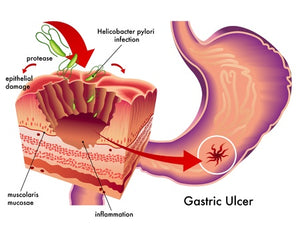Could Probiotics Be the Answer for Helicobacter pylori (H. pylori) Infections?
October 02, 2017

Looking For the Best Probiotic For H. Pylori?
Helicobacter pylori (H. pylori) is a type of bacteria that can cause ulcers, gastritis and other illnesses. Doctors currently treat H. pylori infections with antibiotics and medications to control stomach acid. Resistance to antibiotics can lower the effectiveness of treatment; side effects to antibiotics can also make treatment less effective. New research shows that using probiotics may improve antibiotic treatment for H. pylori infection and reduce side effects.
Try Natren Healthy Trinity
Experience the Natren Difference!
Get 50% OFF our Healthy Trinity 30-count probiotics (plus $9.95 P&H).
Apply discount code BESTTIME at checkout.
Shop Now
About H. Pylori
Helicobacter pylori (H. pylori) are bacteria that can infect the stomach. H. pylori infection can cause peptic ulcers, which are painful sores. Gastric ulcers can develop in the stomach, while duodenal ulcers can develop in the first segment of the small intestine. H. pylori infection is the cause of more than 80 percent of gastric ulcers and up to 90 percent of duodenal ulcers, according to the Centers for Disease Control and Prevention (CDC). H. pylori infections can also cause gastritis, which is inflammation and weakening of the stomach’s mucosal lining.
One-third to one-half of the world’s population is infected with H. pylori. The infection is more common among older adults, African Americans, and Hispanics.
Symptoms of H. pylori Infection
Many people with H. pylori infection never experience symptoms, but some symptoms that may develop include:
- Abdominal discomfort or pain
- Appetite loss
- Nausea
- Vomiting
- Bloating
- Belching
- Fatigue
Conventional Treatment for H. Pylori Infections
Doctors currently treat H. Pylori infections with antibiotics to kill the bacteria and acid reducers to lessen the damage caused by stomach acid. The most commonly used acid reducers include H2 blockers and proton pump inhibitors (PPIs). While acid reducers relieve symptoms of ulcers, they do not treat H. pylori infection – only drugs that eradicate the H. Pylori bacteria can cure the infection.
Doctors prescribe antibiotics to kill H. Pylori, but even the strongest antibiotics have trouble completely eradicating the bacteria. Full eradication is necessary, as leaving just a few bacteria alive can allow infection to return.
To help kill off the bacteria completely, doctors often prescribe triple therapy, which includes a PPI and two antibiotics: clarithromycin and amoxicillin. A 7-day course of triple therapy attains an eradication rate of only 72.9 percent, according to Medscape, and a 14-day course of triple therapy achieves an eradication rate of 81.9 percent.
Doctors have slowed their use of triple therapy in response to the growing problem of antibiotic resistance. Clarithromycin resistance is the main reason a 7-day course of triple therapy fails. Furthermore, some patients experience side effects from antibiotics, which means they have trouble staying in treatment long enough to kill off H. Pylori.
Understanding H. Pylori Infections: The Research Continues
Scientists have just begun to understand the connection between ulcers and H. pylori. Drs. Barry Marshall and Robin Warren of Perth, Australia, were the first to discover H. pylori in the stomachs of patients with gastric and duodenal ulcers in 1982. Prior to that, doctors thought spicy food, stress, acid, and lifestyle were the major causes of ulcers.
The understanding of the bacteria and research into its treatment has evolved. Computers now help researchers analyze large amounts of information to understand the effects of H. pylori.
Today, reviews and meta-analyses are the gold standards for evaluating large amounts of data and drawing statistically stronger conclusions. To perform a systematic review, researchers collect and summarize empirical evidence with the intent of answering a well-defined question. In a meta-analysis, scientists use statistical methods to summarize the results of multiple studies.
Studies Showing Probiotics Improving H. Pylori
Many studies investigate ways to improve eradication of H. pylori bacteria. Other studies explore treatment options, such as the use of probiotics to improve H. pylori eradication. Probiotics are live bacteria and yeasts that provide health benefits to their host. These beneficial microbes can improve intestinal flora balance, inhibit the growth of harmful bacteria, promote digestion, boost immunity, and increase resistance to infection.
Probiotics can minimize antibiotic side effects. Antibiotics can disrupt the balance of flora in the bacteria and cause diarrhea. Probiotics restore this balance to reduce diarrhea. Lactobacillus and Bifidobacterium based probiotics, also have anti-inflammatory effects that help gastritis and antioxidant effects to reduce damage to the stomach lining.
Brand new 2017 Systemic Review and Meta-analysis Shows Probiotics Improve Eradication of H. Pylori.
Probiotic supplementation can help kill H. pylori, according to results of a new recent systematic review and meta-analysis. The study also showed that probiotics are associated with fewer adverse events.
Researchers included 140 studies that looked at 20,215 patients in the meta-analysis. The researchers included more than 10 kinds of probiotics and combinations, including Lactobacillus and Bifidobacterium, into the study. They found that 84 percent of people who used probiotics achieved full eradication of H. pylori, while only 70 percent of those using antibiotics alone had achieved full eradication. The probiotics also reduced side effects.
More research will help scientists gain a better understanding of how probiotics might improve treatment for H. pylori infections and reduce side effects.
If you're having trouble with your stomach and bad bacteria, try Natren Megadophilus before each meal. Shop Now
The post Could Probiotics Be the Answer for Helicobacter pylori (H. pylori) Infections? appeared first on Natren Probiotics Blog.




Leave a comment